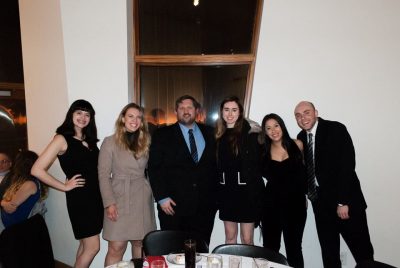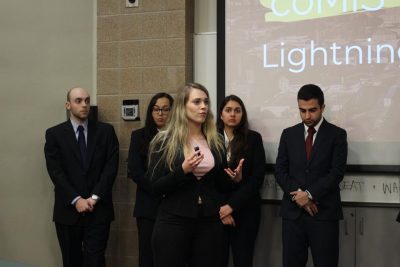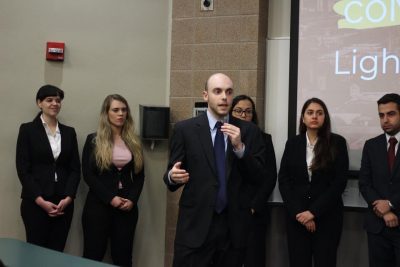 On Wednesday, April 10th, the University of Connecticut’s Operations and Information Management (OPIM) Department sent a team of talented students to participate in the University of Minnesota’s (UMN’s) CoMIS case competition. In order to qualify for the trip, each student had to take the Business Case Competitions independent study (OPIM 4899-004) and show substantial improvement in each of their weekly presentations for the class. Although difficult for Jonathan Moore, the Business Case Competitions instructor and Management Information Systems (MIS) director, he decided to invite students Mariela Kridzelis (MIS & English ’19), Joseph Gauthier (MIS ’20), and Victoria Trautman (MIS ’20) to compete. Joining the three students were himself and MIS senior Hannah Bonitz as assistant coach, who had competed in the CoMIS case competition the year before.
On Wednesday, April 10th, the University of Connecticut’s Operations and Information Management (OPIM) Department sent a team of talented students to participate in the University of Minnesota’s (UMN’s) CoMIS case competition. In order to qualify for the trip, each student had to take the Business Case Competitions independent study (OPIM 4899-004) and show substantial improvement in each of their weekly presentations for the class. Although difficult for Jonathan Moore, the Business Case Competitions instructor and Management Information Systems (MIS) director, he decided to invite students Mariela Kridzelis (MIS & English ’19), Joseph Gauthier (MIS ’20), and Victoria Trautman (MIS ’20) to compete. Joining the three students were himself and MIS senior Hannah Bonitz as assistant coach, who had competed in the CoMIS case competition the year before.
The morning of April 10th, all students met Professor Moore to fly out to Minneapolis. During the kickoff dinner they were introduced to their rooms, other teams, and their competitors for the preliminary round. After a good night’s sleep, they were ready to visit the sponsor sites and prepare for the competition.
 On day two, students and faculty were invited to partake in one of two tours: a tour of the Federal Reserve Bank of Minnesota or a tour of the U.S. Bank Stadium. Both were interesting snapshots of what Minneapolis had to offer and allowed competing schools to mingle with each other while experiencing something new. “The U.S. Bank Stadium definitely lived up to the hype,” said Gauthier. “Every aspect of the modern fan experience was covered and integrated with top class engineering and [information technology] solutions.” For the Federal Reserve Bank tour, both Moore and Kridzelis enjoyed learning about the Federal Reserve System and how artificial intelligence (A.I.) is helping workers count, transport, and sort money.
On day two, students and faculty were invited to partake in one of two tours: a tour of the Federal Reserve Bank of Minnesota or a tour of the U.S. Bank Stadium. Both were interesting snapshots of what Minneapolis had to offer and allowed competing schools to mingle with each other while experiencing something new. “The U.S. Bank Stadium definitely lived up to the hype,” said Gauthier. “Every aspect of the modern fan experience was covered and integrated with top class engineering and [information technology] solutions.” For the Federal Reserve Bank tour, both Moore and Kridzelis enjoyed learning about the Federal Reserve System and how artificial intelligence (A.I.) is helping workers count, transport, and sort money.
On CoMIS day three, all teams were confined to their respective hotel rooms to assemble their business solution in twenty-four hours. The prompt asked participating teams to try to help U.S. Bank increase IT security through the use of biometric technology. For UConn’s team, self-named “CoMMIT,” their ideas were the following: iris technology to get access to bank information, fingerprint activated payment cards, and A.I. chatbots that improve with machine learning to detect call-center fraud.
After the case was completed, which took approximately twenty hours of consecutive and/or simultaneous work from all team members, Trautman, Gauthier, and Kridzelis took advantage of the time they had left to rest and practice before their presentation. As they were selected to present at 9:00 AM, that meant that they had to deliver their case by 8:20 AM. The anxiety and tensions were high, signaled by a few pauses and self-doubt when mistakes were made during practice runs. When 8:00 AM hit, they realized they had to get ready to leave. “We just had to trust ourselves and each other,” said Kridzelis. “We knew our nerves were getting to us, but we reminded ourselves of each others’ potential and that, in the moment, we would be okay.”
 When CoMMIT finally presented in front of their panel of judges, the professionalism that emanated from each team member masked any unease they were experiencing during the fifteen minutes they were given. Due to the creativity of CoMMIT’s solutions, they were able to get second place out of all teams in their randomized bracket for the preliminary round (which included three winning schools from the year before). This meant that they had a chance to go to finals through a question-and-answer lightning round. Unfortunately, they did not advance beyond this point, but ended up achieving seventh place overall “Our team stayed for a short time, but managed a good showing against steep competition,” said Moore. “Although there were times where I felt I would nearly fall down, I always had a teammate ready to pick me back up,” followed Trautman.
When CoMMIT finally presented in front of their panel of judges, the professionalism that emanated from each team member masked any unease they were experiencing during the fifteen minutes they were given. Due to the creativity of CoMMIT’s solutions, they were able to get second place out of all teams in their randomized bracket for the preliminary round (which included three winning schools from the year before). This meant that they had a chance to go to finals through a question-and-answer lightning round. Unfortunately, they did not advance beyond this point, but ended up achieving seventh place overall “Our team stayed for a short time, but managed a good showing against steep competition,” said Moore. “Although there were times where I felt I would nearly fall down, I always had a teammate ready to pick me back up,” followed Trautman.
Although CoMMIT did not make it to finals, they grew in those few days in Minnesota, became closer with each other, and gained feedback that would help them in the future. “In any competition, there are bound to be winners,” said Bonitz in retrospection,” but being a winner doesn’t always mean getting the gold. We celebrated the experience and what we learned from it–that was our real reward.”
We would like to thank the University of Minnesota for inviting us back to the CoMIS case competition, and for Noel Vierra for being such a wonderful team host. We hope to continue bringing our best talent to the playing field in the years to come.